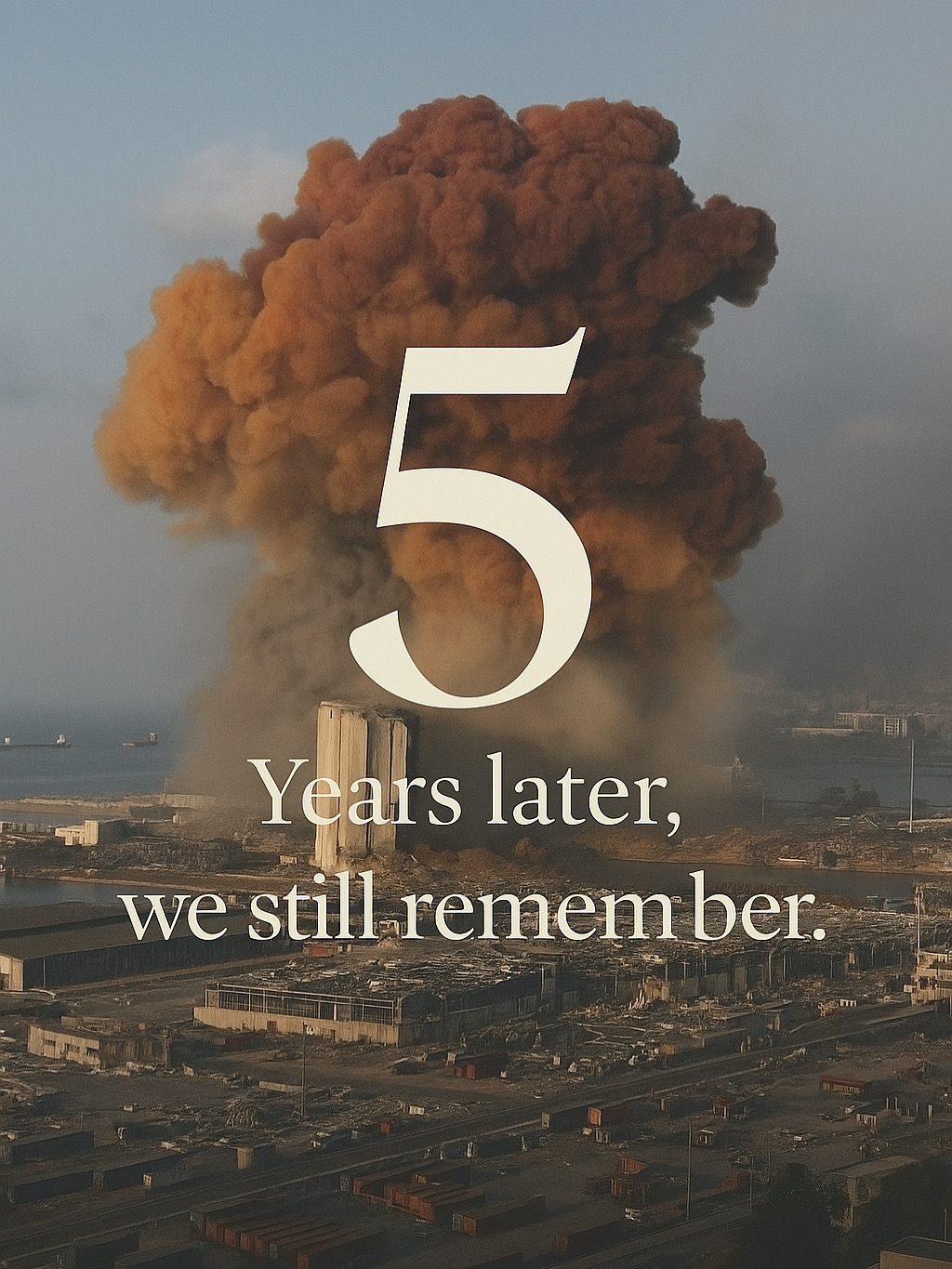by Maria Keyrouz, Clinical Psychologist and Psychotherapist
Five years ago, at exactly 6:07 PM on August 4, 2020, the heart of Beirut was torn open. The port explosion killed over 200 people, injured thousands more, and left a permanent mark on Lebanon’s psyche. The shockwave shattered buildings, but what it did to the nervous system of a nation was just as devastating, though much less visible.
Trauma That Doesn’t Expire
Trauma doesn’t obey the passing of time. Five years later, many people still carry the blast inside them. They carry it in migraines that won’t go away, in the way they flinch at slamming doors, in dreams soaked with panic, in tears they don’t understand.
Grief doesn’t always look like crying. Sometimes it’s silence. Sometimes it’s irritability. Sometimes it’s forgetting what joy feels like. Trauma lingers in the body when it hasn’t had the space, safety, or support to be fully seen.
Anniversaries are not just markers of time, they are triggers. They reopen wounds. They remind us that healing isn’t about forgetting, it’s about learning how to live beside what we’ve survived.
The Weight of Injustice
It is impossible to speak about this trauma without naming injustice. There has been no accountability, no closure, no comfort from those in power. This silence is another form of violence. When there is no justice, trauma calcifies. When no one is held responsible, people are left to hold everything on their own.
This affects the psyche. It deepens helplessness. It keeps people stuck in survival mode. For some, it feels like their pain doesn’t matter. For others, it confirms a lifelong fear that no one is coming to help.
Resilience and Burnout
Lebanese people are often praised for their resilience. But resilience is not the absence of pain. It is not proof that we are okay. Many people are still exhausted. Still dissociating. Still waking up anxious or going to bed with clenched jaws.
Rebuilding isn’t healing. Being able to work again doesn’t mean you’re fine. Numbness is not peace. Some people still can’t return to the neighborhoods they once lived in. Some haven’t spoken about that day since. That too is survival.
A Gentle Reminder
Five years later, Beirut still carries the explosion. You are not weak if you do too. If you feel tired, angry, hopeless, triggered, if you cry unexpectedly or go numb at the news, it means your body remembers.
You are allowed to still feel. You are allowed to grieve. You are allowed to not be over it.
We do not heal by forcing ourselves to move on. We heal by remembering, by honoring, and by being with what still hurts — together.
References
El Hokayem, N., et al. (2022). “The apocalypse”: A qualitative pilot study of the psychological aftermath of the 2020 Beirut blast. International Journal of Social Psychiatry, 68(6), 1219–1227. https://doi.org/10.1177/00207640221087610
Fadel, N. (2021, August 2). Beirut blast left deep scars among Lebanon’s children and adults. AP News. https://apnews.com/article/mental-health-health-lebanon-coronavirus-pandemic-trauma-841742a6936e7118dd24e5c73e9831a9
Khraiche, D. (2025, July 25). Lebanon prosecutor files new charges in 2020 port explosion. AP News. https://apnews.com/article/d558e3fde568ab1d5a952d898f18fab2
Knecht, E. (2024, September 4). Lebanese already haunted by past traumas fear more catastrophes to come. Reuters. https://www.reuters.com/world/middle-east/lebanese-already-haunted-by-past-traumas-fear-more-catastrophes-come-2024-09-04
Malas, N. (2021, August 4). Beirut explosion survivors endure psychological scars. PBS NewsHour. https://www.pbs.org/newshour/world/beirut-explosion-survivors-endure-psychological-scars
Najjar, L. (2025, August 4). Beirut port blast victims say five years later, justice feels a bit closer. Al Jazeera. https://www.aljazeera.com/features/2025/8/4/beirut-port-blast-victims-say-five-years-later-justice-feels-a-bit-closer
Youssef, K., et al. (2022). Somatic trauma in the aftermath of the Beirut blast. National Center for Biotechnology Information (NCBI), PMC. https://www.ncbi.nlm.nih.gov/pmc/articles/PMC9575829
